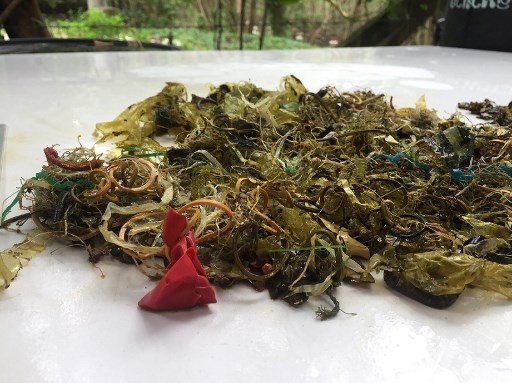Popular Reads
Top Results
Can't find what you're looking for?
View all search resultsPopular Reads
Top Results
Can't find what you're looking for?
View all search resultsThai turtle's plastic-filled stomach highlights ocean crisis
Change text size
Gift Premium Articles
to Anyone
 This handout picture taken on June 6, 2018 and released by the Marine and Coastal Resource Research and Development Centre on June 11, 2018 shows debris removed by government veterinarians from the stomach of a green turtle, a protected species at the marine center in Chantaburi province. Plastic, rubber bands, pieces of balloon and other rubbish filled the turtle's intestinal track, leaving it unable to eat and causing its death two days later.
(AFP/MARINE AND COASTAL RESOURCE DEVELOPMENT CENTRE)
This handout picture taken on June 6, 2018 and released by the Marine and Coastal Resource Research and Development Centre on June 11, 2018 shows debris removed by government veterinarians from the stomach of a green turtle, a protected species at the marine center in Chantaburi province. Plastic, rubber bands, pieces of balloon and other rubbish filled the turtle's intestinal track, leaving it unable to eat and causing its death two days later.
(AFP/MARINE AND COASTAL RESOURCE DEVELOPMENT CENTRE)
S
tartling images of plastic shreds, rubber bands and other debris found jammed in the stomach of a green turtle in Thailand have highlighted the crisis of waste-strewn seas following the widely publicised death of a whale this month.
Thailand is one of the world's largest consumers of plastic, which kills hundreds of marine mammals and reptiles swimming off its coasts every year.
The problem grabbed public attention in the first week of June when an autopsy of a dead pilot whale found near the border with Malaysia revealed 80 plastic bags inside its stomach.
The green turtle, a protected species, suffered a similar fate after washing up on a beach in the eastern province of Chanthaburi on June 4, Weerapong Laovechprasit, a veterinarian at the Eastern Marine and Coastal Resource Research and Development Centre, told AFP.
Plastic, rubber bands, pieces of balloon and other rubbish had filled the turtle's intestinal tract, leaving it unable to eat and causing its death two days later.
"It was feeling weak and couldn't swim," Weerapong said. "The main cause of death is the sea trash."
Veterinarians discovered the blockage using X-rays and tried to save the turtle by feeding it intravenously, but were only able to extract the garbage after its death.
Weerapong said that in the past about 10 percent of the green turtles stranded on beaches in the area had ingested plastic or suffered infections after coming into contact with the waste, but this year about 50 percent of the incidents were trash-related.
More than half of the eight million tonnes of plastic waste dumped into the world's oceans every year comes from five Asian countries: China, Indonesia, the Philippines, Vietnam and Thailand, according to a 2015 Ocean Conservancy report.






